A History of Habit
A History of Habit
From Aristotle to Bourdieu
Edited by Tom Sparrow and Adam Hutchinson
LEXINGTON BOOKS
Lanham Boulder New York Toronto Plymouth, UK
Published by Lexington Books
A wholly owned subsidiary of The Rowman & Littlefield Publishing Group, Inc.
4501 Forbes Boulevard, Suite 200, Lanham, Maryland 20706
www.rowman.com
10 Thornbury Road, Plymouth PL6 7PP, United Kingdom
Copyright 2013 by Lexington Books
All rights reserved. No part of this book may be reproduced in any form or by any electronic or mechanical means, including information storage and retrieval systems, without written permission from the publisher, except by a reviewer who may quote passages in a review.
British Library Cataloguing in Publication Information Available
Library of Congress Cataloging-in-Publication Data
A history of habit from Aristotle to Bourdieu / edited by Tom Sparrow and Adam Hutchinson.
p. cm.
Includes bibliographical references and index.
ISBN 978-0-7391-8198-0 (cloth : alk. paper) ISBN 978-0-7391-8199-7 (electronic)
1. Habit (Philosophy) I. Sparrow, Tom, 1979 editor of compilation.
B105.H32H57 2013
128'.3dc23
2013010683
 TM The paper used in this publication meets the minimum requirements of American National Standard for Information Sciences Permanence of Paper for Printed Library Materials, ANSI/NISO Z39.48-1992.
TM The paper used in this publication meets the minimum requirements of American National Standard for Information Sciences Permanence of Paper for Printed Library Materials, ANSI/NISO Z39.48-1992.
Printed in the United States of America
For George Yancy, both the Monongahela
and Allegheny to our little Ohio.
Habit is a compromise effected between the individual and his environment, or between the individual and his own organic eccentricities, the guarantee of a dull inviolability, the lightning-conductor of his existence.
Beckett, Proust
Plato scolded a child who was playing at cobnuts. He answered him: You scold me for a small matter. Habit, replied Plato, is no small matter.
Montaigne, Essays
Acknowledgments
Despite careful preparation, the task of compiling an edited collection leads editors into unforeseen difficulties. At every turn, from the preparation through the detours, George Yancy helped us navigate this endeavor with his bottomless practical knowledge and enthusiasm. It is his guidance to which we are most indebted. Since contributors ultimately provide the contours of a book such as ours, we are incredibly grateful to them for providing this book with its distinct shape and conceptual rigor. We thank all of you for your faith, diligence, and dedication to our project. Along the way we also solicited aid from Jennifer Bates, John Fritz, Ron Polansky, Anthony Steinbock, Jim Swindal, and Nick Warcholak. Their strategic help enabled us in major ways; we thank each of you for it. Last, but not least, we must thank Jana Hodges-Kluck, our editor at Lexington Books, for readily acknowledging the philosophical merits of our project and for taking it on at the press and seeing it to print.
Introduction
Tom Sparrow and Adam Hutchinson
Reflections on the Unreflected
1. About the Philosophy of Habit and This Book
Ren Descartes believed common sense to be the most equitably distributed thing in the world. The essays collected here contest Descartes assessment by affirming that habit enjoys a more generous distribution, for it is detectable not only in the minds of humans, but also in the behavior of non-human animals, the dynamics of populations, the growth patterns of plants, and the tendencies of systems. Under the influence of C. S. Peirce and Charles Darwin, William James went even one step further when he claimed that the laws of nature are nothing more than habits. The metaphysical weight of this pronouncement is as palpable as Vladimirs ambivalent tone. The reach of habit, however, cannot be confined to the behavioral, moral, or existential spheres. It admits of biological, sociological, psychological, neurological, epistemological, phenomenological, and ontological dimensions among many others.
When you peek beyond the popular discourse familiar to everyone what you find is a rich philosophical discussion of the role that habit plays in our personal, political, spiritual, and intellectual lives. Countless questions arise in the history of habit. Is it simply a psychological phenomenon, easily manipulated by positive and negative reinforcement? Are customs and passions different in kind or degree? Are personality and character habitual? How do habits help or hinder our attempts to solve problems? Does habit function at the transcendental or empirical level (or both)? Do inanimate objects possess habits, or can only sentient creatures act habitually? What about plants? Do habits constitute our first or second nature? Can we exist without habits? Can we be sure that the laws of nature are more (or less) than physical habits? What is the metaphysics of habit? If only one thing is agreed upon between anyone who has offered a reflection on these questions, it is that habit solicits contradictory evaluations. It remains an elusive concept, but one with great explanatory power. This, as much as its enduring significance and ambivalent interpretation, provoked us to assemble a text that would exhibit the plurality of ways that habit has been used to explain, understand, and regulate the world.
The idea for this book grew out of a series of informal discussions on the history of philosophy which took placehabitually, it should be notedat Hanlons Caf in Pittsburgh, Pennsylvania, not far from the campus of Duquesne University. It owes just as much to our respective research into theories of embodiment and, especially, a common interest in the naturalistic philosophy of the pragmatists, for whom habit is a basic mechanism of human nature. Adding to this a mutual affection for David Hume and a long-standing familiarity with the account of virtuous individuals outlined in the Nicomachean Ethics, we began to regard habit as one of the most recurrent and useful concepts at work in the history of Western philosophy. We suspect that many readers will see this as a truism, which is why we were surprised to find a text on the history of habit unavailable. We have therefore sought to assemble one that would make explicit the largely unheralded, yet readily acknowledged, role that habit plays in the history of philosophy, while at the same time demonstrating its privileged importance for many prominent thinkers, for example, Aristotle, Thomas Aquinas, Descartes, Hume, Maurice Merleau-Ponty, Pierre Bourdieu, and entire schools of thought, such as Roman Stoicism and American pragmatism. Most of the chapters focus on how a particular thinker engages the concept of habit in his or her work. Some of them dig deeply into the question of what constitutes a habitthe metaphysics of habit, as it werewhile others, instead of asking what a habit is, examine how the concept can be appliedto ethical practice, social problems, or intellectual endeavorto better understand and change the order of things. As editors we asked each contributor to explore either or both of these dimensions, and to do so with a view toward demonstrating the historicity of their figures mobilization of habit. This is achieved to a greater or lesser degree, contingent upon the contributors discipline, tradition, and methodological approach. The variability resulting from this pluralism, rather than constituting a weakness, is one of the collections chief virtues. It reflects the pluralistic history of habit itself and is why we committed ourselves as editors to soliciting, as well as preserving, the multiple sensibilities of our contributors.
Next page
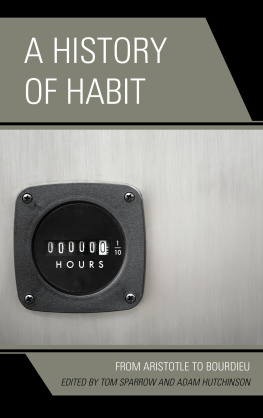

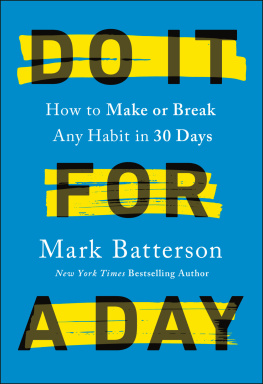


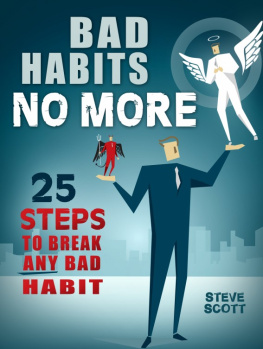
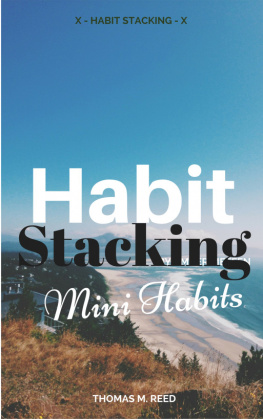

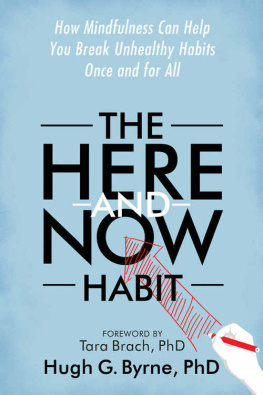

 TM The paper used in this publication meets the minimum requirements of American National Standard for Information Sciences Permanence of Paper for Printed Library Materials, ANSI/NISO Z39.48-1992.
TM The paper used in this publication meets the minimum requirements of American National Standard for Information Sciences Permanence of Paper for Printed Library Materials, ANSI/NISO Z39.48-1992.